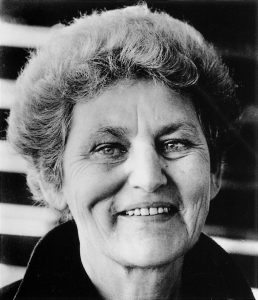
Austin American-Statesman
May 8, 1994
Working class mother wins Rea Award
By Anne Morris
American-Statesman Staff
Tillie Olsen, a working class mother who reared four children on her own and wrote movingly about the conflicts in her life, recently won the $25,000 Rea Award for the Short Story.
One of her most famous stories, I Stand Here Ironing, is about a mother who gets a note from someone at her daughter’s school:
“I stand here ironing, and what you asked me moves tormented back and forth with the iron.
“I wish you would manage the time to come in and talk with me about your daughter. I’m sure you can help me understand here. She’s a youngster who needs help and whom I’m deeply interested in helping.”
The story that follow is a narrator’s thoughts and the daughter she has reared, her difficulties, and her potential. It ends with the mother’s plea to the school: “Only help her to know that she is more than this dress on the ironing board, helpless before the iron.”
Olsen won the Rea Award because “she has forced open the language of the short story, insisting that it include the domestic life of women.” Olsen was 50 years old, the mother of four and the veteran of many humdrum jobs when her first book, the shorts stories collection in Tell Me a Riddle, was published in 1962. It will be reissued this fall as a Dell paperback.
Previous winners of the Rea Award include Grace Paley, Eudora Welty and Paul Bowles.
Poets & Writers Magazine
July/August 1994
Dungannon Foundation
Rea Award for the Short Story
Tillie Olsen has received the $25,000 Rea Award for the Short Story for 1993. The prize is given annually by the Dungannon Foundation to a living U.S. writer who has made a significant contribution to the short sort as an art form.
Olsen was 50 years old in 1962 when her first book, the short story collection Tell Me a Riddle, was published; it will be reissued this fall by Dell. She is also the author of a book of essays, Silences (Delacorte, 1978). The judges for this year’s award were Charles Baxter, Susan Cheever, and Mary Gordon.
To be eligible for consideration, a writer must have published at least one short story in the four years preceding the presentation of the award. The recipient is nominated and selected by a jury; there is no application process.
The Litchfield County Times
April 29, 1994
Rea Award Goes to Tillie Olsen
The 25,000 Rea Award for the Short Story, established in 1986 by Michael Rea of Washington, has been awarded to Tillie Olsen.
Jurors for the 1994 Rea Award, authors Charles Baxter, Susan Cheever and Mary Gordon, have the following citation: “With her collection, Tell Me a Riddle, Tillie Olsen radically widened the possibilities for American writers of fiction. These stories have the lyric intensity of an Emily Dickinson poem and the scope of a Balzac novel. She has forced open the language of the short story, insisting that it include the domestic life of women, the passions and anguishes of maternity, the deep, gnarled roots of a long marriage, the hoes and frustrations of immigration, the shining charge of political commitment. Her voice has both challenged and cleared the way for all those who come after her.”
The Rea Award for the Short Story honors a writer who has made a significant contribution to the short story as an art form. It is given annually by the Dungannon Foundation to a living U.S. writer. The award cannot be applied for; the recipient is nominated and selected by a jury.
Previous winners of the Rea Award for the Short Story are Cynthia Ozick (1986), Rober Coover (19870, Donald Barthelme (1988), Tobias Wolff (1989), Joyce Carol Oates (1990), Paul Bowles (1991), Eudora Welty (1992) and Grace Paley (1993).
The conflict between the demands of daily existence and the fulfillment of human potential is a theme which permeates Tillie Olsen’s work. For 20 year, she was “silenced” as a writer while working to earn a living and single-handedly raising four daughters. “These are not natural silences, that necessary time for renewal,” she says. “They are the unnatural thwarting of what struggles to come into being but cannot.”
Tillie Olsen was 50 years old when her first book was published in 1962.